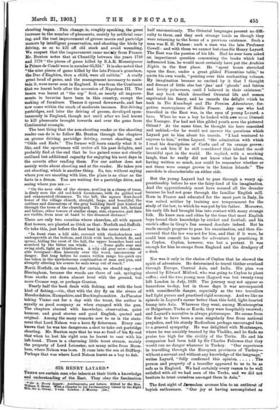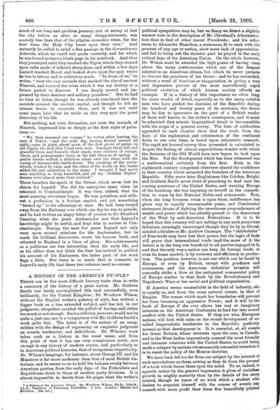SIR HENRY LAYARD.*
Tnnan are certain men who inherit at, their birth a knowledge and understanding a the East, They obey the fascination -*Sir A. • Henri Laved Autobiography and Letters. Edited by Ste Hon. William N. Bruce. With a Chapter on his Parliamentary, Career by the night Soh. Sir A. Otway. 2 *Ms. London : J. Murray. [2.5s. J half unconsciously. The Oriental languages present no diffi- culty to them, and they seek strange lands as though they were returning to the home of a previous existence. Such a man was E. H. Palmer : such a man was the late Professor Cowell : and with them we cannot but class Sir Henry Layard. The East was the passion of his life. Had he ever been asked an impertinent question concerning the books which had influenced him, he would most certainly have put the Arabian Nights in the first place. He "spent hours stretched upon the floor, under a great gilded Florentine table," to quote his own words, "pouring over this enchanting volume. My imagination became so excited by it that I thought and dreamt of little else but jins ' and ghouls' and fairies and lovely princesses, until I believed in their existence." But any book which described Oriental life and scenes captivated his fancy, and he records the delight which he took in The Kuzzibagh and The Persian Adventurer,' for- gotten masterpieces of Bailie Fraser. Any one who had travelled in the East was, in the eyes of young Layard, a hero. When he was a boy he looked with awe upon Disraeli the Younger, For had not this gilded youth seen the pictured Orient? At the same time, he thought his hero conceited and unkind,—for he would not answer the questions which Layard put to him about his travels. " I had ventured to express to him," writes Layard, " the admiration with which I read his descriptions of Coda and of its orange groveii,: and to ask him if he still considered that island the most beautiful spot in the world. He replied, with a mocking laugh, that he really did not know what he had written, having written so much, nor could be remember whether or not there were orange groves in the Ionian Islands." The anecdote is characteristic on either side.
But the young Layard had to pass through a weary
ap-
prenticeship before he saw the fairy-land of his imagination. And the apprenticeship must have seemed all the drearier because he had not gone through the familiar English mill. Born in France and educated for the most part in Italy,Xe was suited neither by training nor temperament for the study of the law, to which he was put by his father. Moreover, his early life had brought him into contact with many strange folk. He knew men and cities by the time that most English boys bound their knowledge by cricket and football, and his uncle's office in Gray's Inn seemed desolate indeed. But he made enough progress to pass his examination, and then dis- covered that the law was not for him, and that if it were, he could best consult his taste for adventure by practising it in Ceylon. Ceylon, however, was but a pretext. It was enough for him to escape from England and the drudgery of a desk.
Nor was it only in the choice of Ceylon that he showed the spirit of adventure. He determined to travel thither overland through Europe, Central Asia, and India. His plan was shared by Edward Mitford, who was going to Ceylon to plant coffee; and the two young men (Layard was but twenty-two) left. London in July, 1839. The journey may not appear so hazardous to-day, but in those days it was accompanied with considerable danger, especially as the two travellers had light purses and,practised rigid economy. And we like no episode in Layard's career better than this bold, light-hearted tramp into Asia. Wherever they went, among Montenegrins or Bulgarians, Turks or Kurds, they were hospitably received; and Layard's narrative is always picturesque. He seems from the first to have been a man singularly free from national prejudice, and his sturdy Radicalism perhaps encouraged him to a general sympathy. He was delighted with Montenegro, where he was amiably treated by the Yladika, and he finds no praise too high for the civility of the Turks, He and his companion had been told by Sir Charles Fellowes that they would run no danger whatever in Turkey. " Our experience in travelling through the European provinces of Turkey— without a servant and without any knowledge of the language," Writes Layard, "fully confirmed this opinion. The person and property of a traveller appeared to us to be as safe as in England. We had certainly every reason to be well satisfied with all we had seen of the Turks, and we did not hesitate to trnst ourselves amongst them In Asia."
The first sight of Jornsalem arouses him to an (*Worst Of boyish enthusiasm. " Our joy at having accomplished so
much of our long and perilous journey, and at seeing at last the city before us after so many disappointments, was scarcely less than that of the pilgrim crusaders when, for the first time, the Holy City burst upon their view." And
instantly he called to mind a fine passage in the Gerusalemme Liberates, which he could not quote correctly, and for which he was forced to leave a blank page in his notebook. And thus they journeyed until they reached the Tigris, which they crossed upon rafts made of inflated sheepskins, and within a few days Layard reached Mosul, and looked down upon the spot where
he was to labour and to achieve so much. " In front of us," he writes, " were the vast mounds that marked the site of ancient Nineveh, and covered the ruins which it was my .destiny at a future period to discover. I was deeply moved and im- pressed by their desolate and solitary grandeur." But he had no time to loiter, though he was already convinced that the mounds covered the ancient capital, and though he felt an intense desire to excavate them, and it was not until some years later that he made on this very spot the great discovery of his life.
But nothing, not even Jerusalem, not even the mounds of Nineveh, impressed him so deeply as the first sight of palm- trees r-
" We then resumed our voyage," he writes after leaving the ruin of Tekrit, " and the next day, having floated inward all night, came in sight, about noon, of the first grove of palms on the Tigris, the first that I had ever seen. Amongst these tall and graceful trees, and beneath their shade, were clusters of orange, Aron, and pomegranate trees, in the full blossom of spring. A gentle breeze wafted a delicious odour over the river, with the cooing of innumerable turtle-doves. The creaking of the water- wheels, worked by oxen, and the cities of the Arabs on the banks added life and animation to the scene. I thought I had never seen anything so truly beautiful, and all my Arabian Nights' dreams were almost more than realised."
There breathes the spirit of the Orient, which never lost its charm for Layard. Nor did his enterprise cease when he returned to Constantinople. It was then, indeed, that his most amazing adventure began. He was penniless, and with- out a profession in a foreign capital, and yet something "turned up" to his advantage at once. He had been turned away from the Embassy over which one day he was to preside, and he had written an angry letter of protest to Sir Stratford Canning, when the great Ambassador saw that Layard's knowledge might be useful, and kept him in service in Con- stantinople. During the next few years Layard not only went upon several missions for the Ambassador, but he made his brilliant discoveries, wrote his famous book, and returned to England in a blaze of glory. His achievements as a politician are less interesting than his early life, and as his editor does not think the time has arrived to publish his account of his Embassies, the latter part of the work flags a little. But there is so much that is romantic in Layard's early life that these two volumes need no excuse.











































 Previous page
Previous page